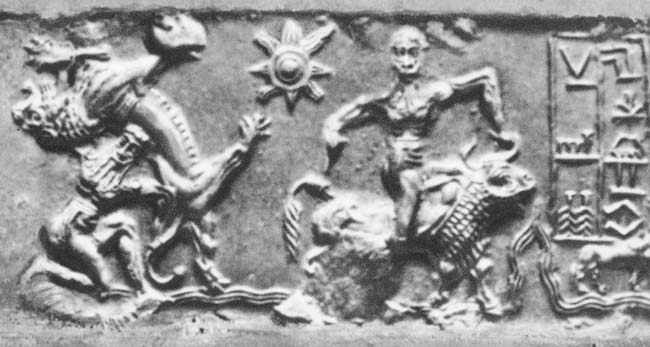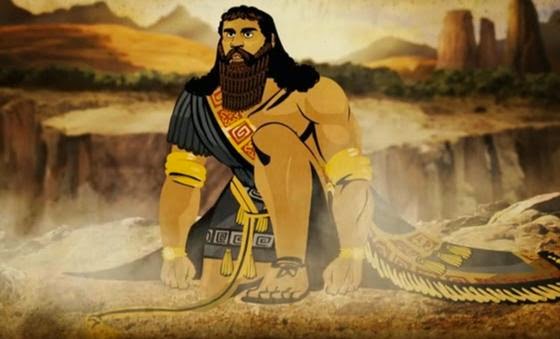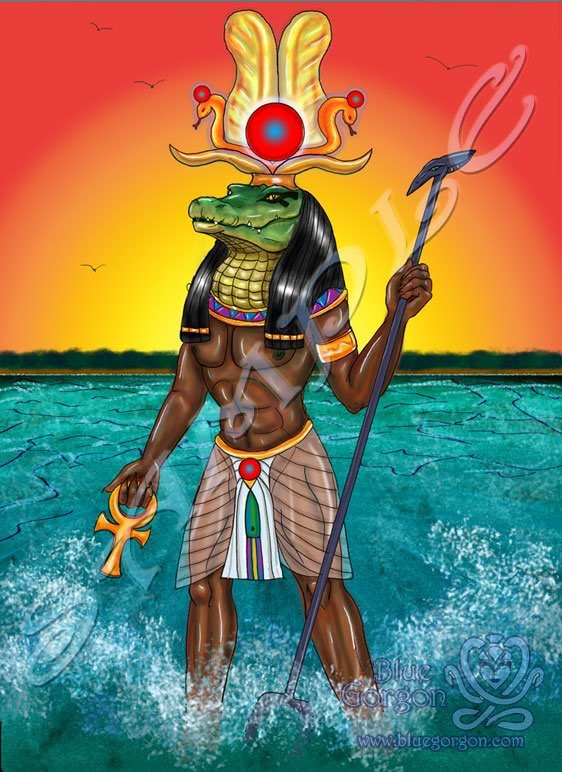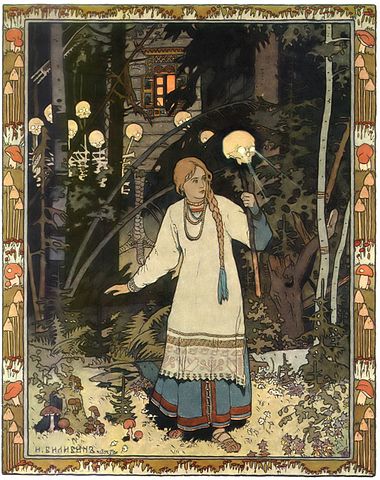Othin spake:
1, "Counsel me, Frigg, for I long to fare,
And Vafthruthnir fain would find;
fit wisdom old with the giant wise
Myself would I seek to match."
Frigg spake:
2. "Heerfather here at home would I keep,
Where the gods together dwell;
Amid all the giants an equal in might
To Vafthruthnir know I none."
Othin spake:
3. "Much have I fared, much have I found.
Much have I got from the gods;
And fain would I know how Vafthruthnir now
Lives in his lofty hall."
Frigg spake:
4. "Safe mayst thou go, safe come again,
And safe be the way thou wendest!
Father of men, let thy mind be keen
When speech with the giant thou seekest."
5. The wisdom then of the giant wise
Forth did he fare to try;
He found the hall | of the father of Im,
And in forthwith went Ygg.
Othin spake:
6. "Vafthruthnir, hail! | to thy hall am I come,
For thyself I fain would see;
And first would I ask | if wise thou art,
Or, giant, all wisdom hast won."
Vafthruthnir spake:
7. "Who is the man | that speaks to me,
Here in my lofty hall?
Forth from our dwelling | thou never shalt fare,
Unless wiser than I thou art."
Othin spake:
8. "Gagnrath they call me, | and thirsty I come
From a journey hard to thy hall;
Welcome I look for, | for long have I fared,
And gentle greeting, giant."
Vafthruthnir spake:
9. "Why standest thou there | on the floor whilst thou speakest?
A seat shalt thou have in my hall;
Then soon shall we know | whose knowledge is more,
The guest's or the sage's gray."
Othin spake:
10. "If a poor man reaches | the home of the rich,
Let him wisely speak or be still;
For to him who speaks | with the hard of heart
Will chattering ever work ill."
Vafthruthnir spake:
11. "Speak forth now, Gagnrath, | if there from the floor
Thou wouldst thy wisdom make known:
What name has the steed | that each morn anew
The day for mankind doth draw?"
Othin spake:
12. "Skinfaxi is he, | the steed who for men
The glittering day doth draw;
The best of horses | to heroes he seems,
And brightly his mane doth burn."
Vafthruthnir spake:
13. "Speak forth now, Gagnrath, | if there from the floor
Thou wouldst thy wisdom make known:
What name has the steed | that from East anew
Brings night for the noble gods?"
Othin spake:
14. "Hrimfaxi name they | the steed that anew
Brings night for the noble gods;
Each morning foam | from his bit there falls,
And thence come the dews in the dales."
Vafthruthnir spake:
15. "Speak forth now, Gagnrath, | if there from the floor
Thou wouldst thy wisdom make known:
What name has the river | that 'twixt the realms
Of the gods and the giants goes?"
Othin spoke:
16. "Ifing is the river | that 'twixt the realms
Of the gods and the giants goes;
For all time ever | open it flows,
No ice on the river there is."
Vafthruthnir spake:
17. "Speak forth now, Gagnrath, | if there from the floor
Thou wouldst thy wisdom make known:
What name has the field | where in fight shall meet
Surt and the gracious gods?"
Othin spake:
18. "Vigrith is the field | where in fight shall meet
Surt and the gracious gods;
A hundred miles | each way does it measure.
And so are its boundaries set."
Vafthruthnir spake:
19. "Wise art thou, guest! | To my bench shalt thou go,
In our seats let us speak together;
Here in the hall | our heads, O guest,
Shall we wager our wisdom upon."
Othin spake:
20. "First answer me well, | if thy wisdom avails,
And thou knowest it, Vafthruthnir, now:
In earliest time | whence came the earth,
Or the sky, thou giant sage?"
Vafthruthnir spake:
21. "Out of Ymir's flesh | was fashioned the earth,
And the mountains were made of his bones;
The sky from the frost-cold | giant's skull,
And the ocean out of his blood."
Othin spake:
22. "Next answer me well, | if thy wisdom avails,
And thou knowest it, Vafthruthnir, now:
Whence came the moon, | o'er the world of men
That fares, and the flaming sun?"
Vafthruthnir spake:
23. "Mundilferi is he | who begat the moon,
And fathered the flaming sun;
The round of heaven | each day they run,
To tell the time for men."
Othin spake:
24. "Third answer me well, | if wise thou art called,
If thou knowest it, Vafthruthnir, now:
Whence came the day, | o'er mankind that fares,
Or night with the narrowing moon?"
Vafthruthnir spake:
25. "The father of day | is Delling called,
And the night was begotten by Nor;
Full moon and old | by the gods were fashioned,
To tell the time for men."
Othin spake:
26. "Fourth answer me well, | if wise thou art called,
If thou knowest it, Vafthruthnir, now:
Whence did winter come, | or the summer warm,
First with the gracious gods?"
Vafthruthnir spake:
27. "Vindsval he was | who was winter's father,
And Svosuth summer begat"
And both of these shall ever be, / Till the gods
to destruction go."
Othin spake:
28. "Fifth answer me well, | if wise thou art called,
If thou knowest it, Vafthruthnir, now:
What giant first | was fashioned of old,
And the eldest of Ymir's kin?"
Vafthruthnir spake:
29. "Winters unmeasured | ere earth was made
Was the birth of Bergelmir;
Thruthgelmir's son | was the giant strong,
And Aurgelmir's grandson of old."
Othin spake:
30. "Sixth answer me well, | if wise thou art called,
If thou knowest it, Vafthruthnir, now:
Whence did Aurgelmir come | with the giants' kin,
Long since, thou giant sage?"
Vafthruthnir spake:
31. "Down from Elivagar | did venom drop,
And waxed till a giant it was;
And thence arose | our giants' race,
And thus so fierce are we found."
Othin spake:
32. "Seventh answer me well, | if wise thou art called,
If thou knowest it, Vafthruthnir, now:
How begat he children, | the giant grim,
Who never a giantess knew?"
Vafthruthnir spake:
33. "They say 'neath the arms | of the giant of ice
Grew man-child and maid together;
And foot with foot | did the wise one fashion
A son that six heads bore."
Othin spake:
34. "Eighth answer me well, | if wise thou art called,
If thou knowest it, Vafthruthnir, now:
What farthest back | dost thou bear in mind?
For wide is thy wisdom, giant!"
Vafthruthnir spake:
35. "Winters unmeasured | ere earth was made
Was the birth of Bergelmir;
This first knew I well, | when the giant wise
In a boat of old was borne."
Othin spake:
36. "Ninth answer me well, | if wise thou art called
If thou knowest it, Vafthruthnir, now:
Whence comes the wind | that fares o'er the waves
Yet never itself is seen?"
Vafthruthnir spake:
37. "In an eagle's guise | at the end of heaven
Hræsvelg sits, they say;
And from his wings | does the wind come forth
To move o'er the world of men."
Othin spake:
38. "Tenth answer me now, | if thou knowest all
The fate that is fixed for the gods:
Whence came up Njorth | to the kin of the gods,--
(Rich in temples | and shrines he rules,--)
Though of gods he was never begot?"
Vafthruthnir spake:
39. "In the home of the Wanes | did the wise ones create him,
And gave him as pledge to the gods;
At the fall of the world | shall he fare once more
Home to the Wanes so wise."
Othin spake:
40. ""Eleventh answer me well,
if thou knowest all / The fate that is fixed for the gods: / What men
are they who in Othin's home / Each day to fight go forth?""
Vafthruthnir spake:
41. "The heroes all | in Othin's hall
Each day to fight go forth;
They fell each other, | and fare from the fight
All healed full soon to sit."
Othin spake:
42. "Twelfth answer me now | how all thou knowest
Of the fate that is fixed for the gods;
Of the runes of the gods | and the giants' race
The truth indeed dost thou tell,
(And wide is thy wisdom, giant!)"
Vafthruthnir spake:
43. "Of the runes of the gods | and the giants' race
The truth indeed can I tell,
(For to every world have I won

To nine worlds came I, | to Niflhel beneath,
The home where dead men dwell."
Othin spake:
44. "Much have I fared, | much have I found,
Much have I got of the gods:
What shall live of mankind | when at last there comes
The mighty winter to men?"
Vafthruthnir spake:
45. "In Hoddmimir's wood | shall hide themselves
Lif and Lifthrasir then;
The morning dews | for meat shall they have,
Such food shall men then find."
Othin spake:
46. "Much have I fared, | much have I found,
Much have I got of the gods:
Whence comes the sun | to the smooth sky back,
When Fenrir has snatched it forth?"
Vafthruthnir spake:
47. "A daughter bright | Alfrothul bears
Ere Fenrir snatches her forth;
Her mother's paths | shall the maiden tread
When the gods to death have gone."
Othin spake:
48. "Much have I fared, | much have I found,
Much have I got of the gods:
What maidens are they, | so wise of mind.
That forth o'er the sea shall fare?"
Vafthruthnir spake:
49. "O'er Mogthrasir's hill | shall the maidens pass,
And three are their throngs that come;
They all shall protect | the dwellers on earth,
Though they come of the giants' kin."
Othin spake:
50. "Much have I fared, | much have I found,
Much have I got of the gods:
Who then shall rule | the realm of the gods,
When the fires of Surt have sunk?"
Vafthruthnir spake:
51. "In the gods' home Vithar | and Vali shall dwell,
When the fires of Surt have sunk;
Mothi and Magni | shall Mjollnir have
When Vingnir falls in fight."
Othin spake:
52. "Much have I fared, | much have I found,
Much have I got of the gods:
What shall bring the doom | of death to Othin,
When the gods to destruction go?"
Vafthruthnir spake:
53. "The wolf shall fell | the father of men,
And this shall Vithar avenge;
The terrible jaws | shall he tear apart,
And so the wolf shall he slay."
Othin spake:
54. "Much have I fared, | much have I found,
Much have I got from the gods:
What spake Othin himself | in the ears of his son,
Ere in the bale-fire he burned?"
Vafthruthnir spake:
55. "No man can tell | what in olden time
Thou spak'st in the ears of thy son;
With fated mouth | the fall of the gods
And mine olden tales have I told;
With Othin in knowledge | now have I striven,
And ever the wiser thou art."






